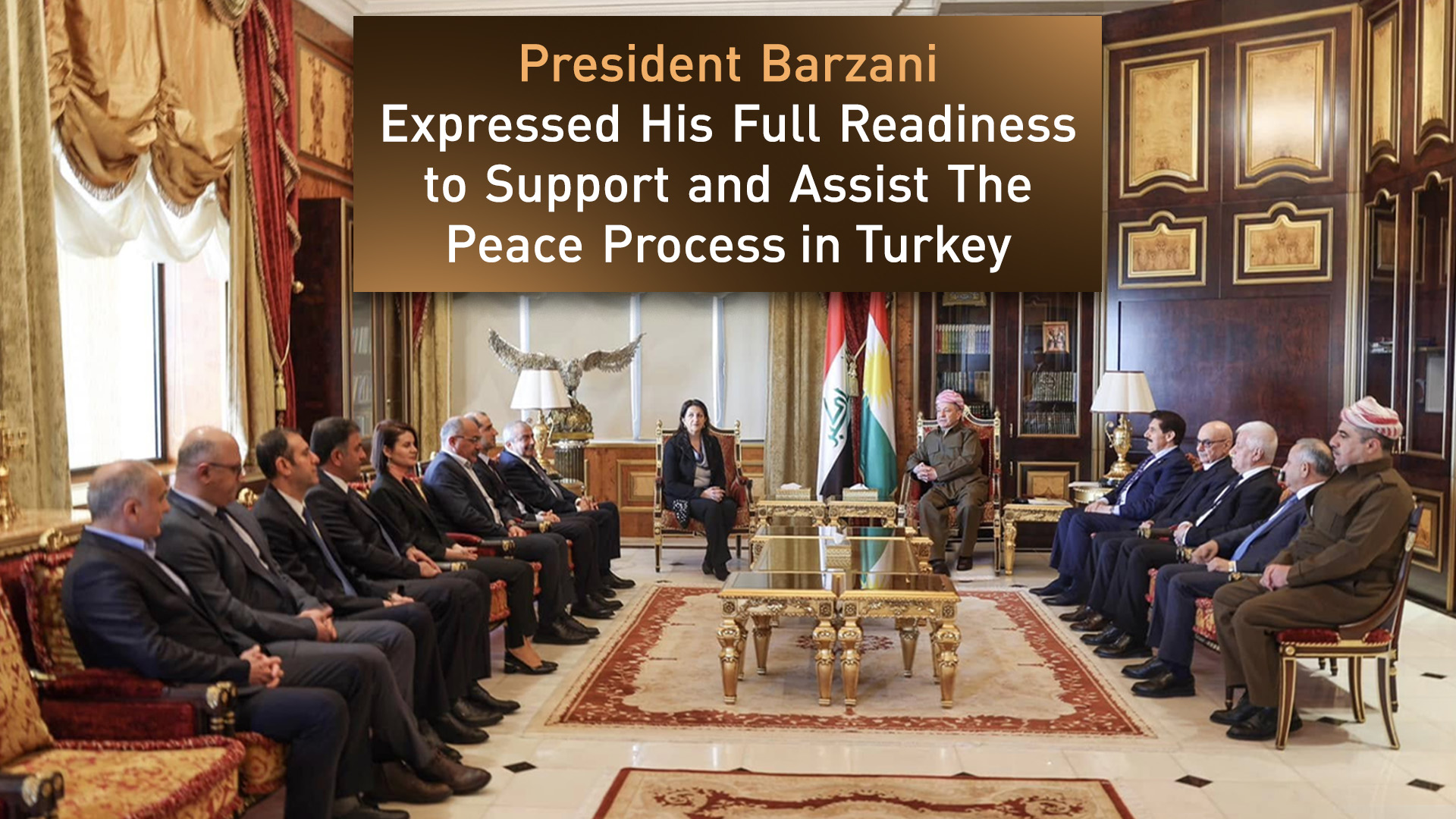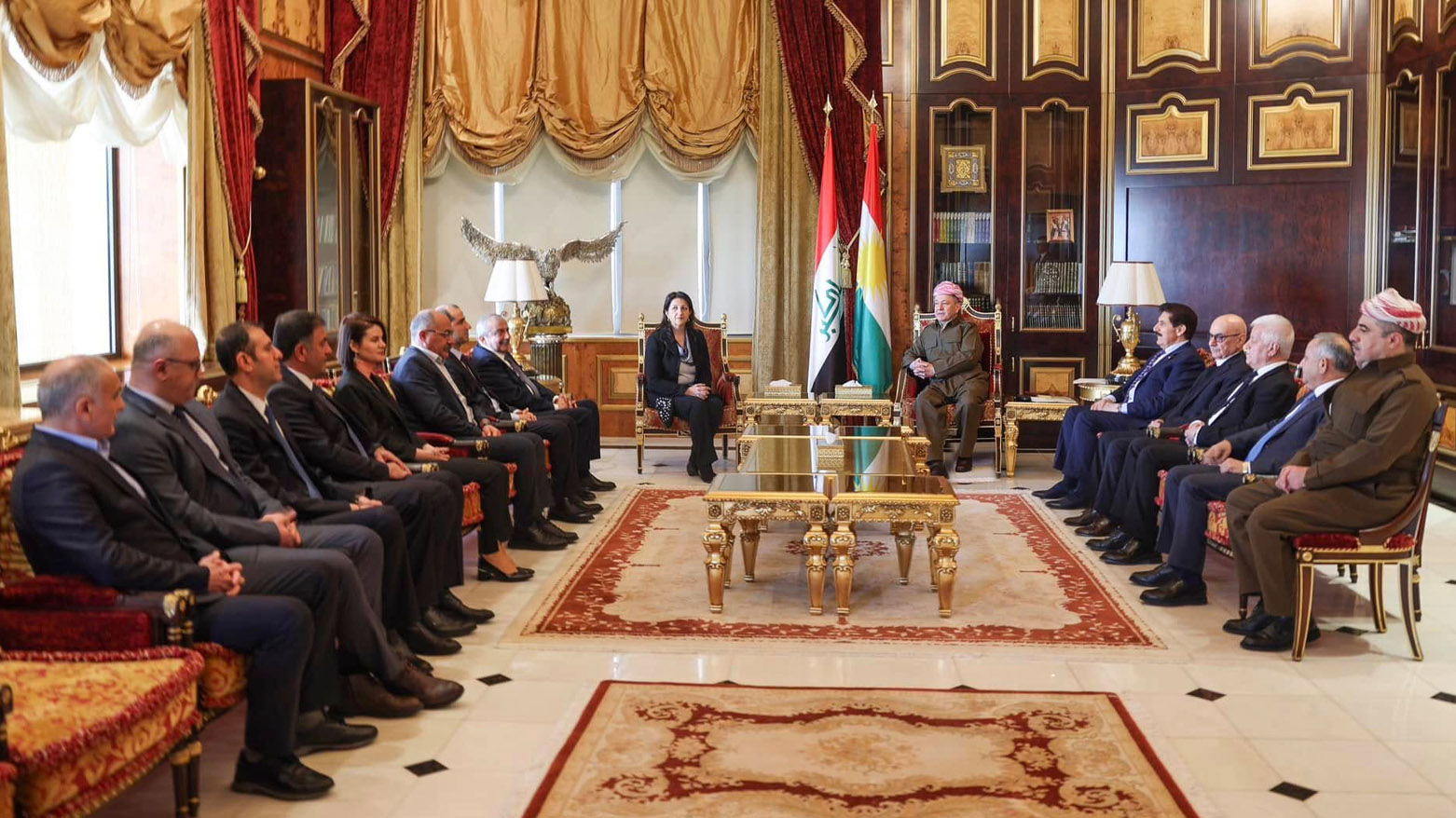President Barzani, DEM Party Delegation Conclude Key Talks on Kurdish Peace Process
Their discussions with President Barzani focused on potential avenues to advance the stalled peace process and the role of Kurdish political leadership in fostering dialogue.

ERBIL (Kurdistan24) – The meeting between President Masoud Barzani and the DEM Party delegation has concluded, marking a significant diplomatic engagement in efforts to revive the Kurdish peace process in Turkey and Northern Kurdistan. The delegation, led by politicians Pervin Buldan and Sirri Sureyya Onder, arrived at Barzani’s headquarters in Pirmam on Sunday to discuss the new peace initiative.
#NOW The DEM Party delegation to Imrali has departed Pirmam following their meeting with President Barzani.
— Kurdistan 24 English (@K24English) February 16, 2025
Stay tuned for more updates. pic.twitter.com/A6wsuyyJ0j
The DEM Party delegation reached Erbil on Saturday for a series of meetings with Kurdistan Region officials. Their discussions with President Barzani focused on potential avenues to advance the stalled peace process and the role of Kurdish political leadership in fostering dialogue.
The delegation is expected to carry Barzani’s perspectives back to Abdullah Ocalan, the imprisoned leader of the Kurdistan Workers' Party (PKK), with whom they have already held two prior meetings regarding the new peace initiative.
Meeting with President Barzani in Pirmam
Following the meeting, President Barzani’s headquarters released a statement highlighting the significance of the meeting with the DEM Party delegation, headed by Ms. Pervin Buldan and Mr. Sirri Sureyya Onder, in Pirmam on Sunday.
The statement highlighted that the visiting delegation presented their perspectives on the political situation and peace process in Turkey, sharing detailed accounts of their meetings with Mr. Abdullah Ocalan.
The delegation also conveyed the content of Mr. Ocalan's message to President Barzani.
President Barzani welcomed the delegation and emphasized the importance of the peace process as the only viable path toward a resolution.
He stressed the necessity for all parties to concentrate their efforts on bringing the peace process to a successful conclusion. President Barzani also expressed his full readiness to support and assist the peace process in Turkey.
This meeting represents a significant step in the ongoing diplomatic efforts to advance peace negotiations and demonstrates the Kurdistan Region's commitment to supporting dialogue and peaceful resolution in the region.
The engagement of President Barzani in these discussions underscores the importance of inclusive regional consultation in the peace process.

DEM Party Issues Statement on the Meeting
Following the meeting, the DEM Party released a statement providing further details about their discussions with President Barzani.
According to the statement, the meeting took place at Barzani’s office in Pirmam and lasted for one hour and 45 minutes. The DEM Party confirmed that this engagement was conducted within the framework of their ongoing discussions with Abdullah Ocalan.
The statement emphasized that President Barzani was fully briefed on the peace process, and his views and proposals were received by the delegation. The DEM Party underlined the significance of Barzani’s insights in shaping their strategy moving forward.
The delegation’s diplomatic engagements in the Kurdistan Region will continue, with a scheduled meeting tomorrow with Kurdistan Region President Nechirvan Barzani.
President Barzani’s Role in the Peace Process
Pervin Buldan underscored the importance of President Barzani’s input on Friday, revealing that Ocalan had specifically requested their consultation with the Kurdish leader.
Read More: DEM Party Delegation to Discuss Peace Process with President Barzani
President Barzani’s extensive experience in navigating regional political complexities positions him as a crucial interlocutor in shaping future peace efforts. The delegation has affirmed that President Barzani’s proposals will be relayed directly to Ocalan as they continue their discussions on the evolving framework for peace.
While a third meeting with Ocalan is anticipated, Buldan has stated that no exact date has been set, as they await a call from the PKK leader. The anticipated discussions with Ocalan are expected to shape the next steps of the peace process, potentially leading to broader negotiations aimed at ending decades of conflict.
This engagement comes as DEM Party Co-Chair Tulay Hatimogullari has announced that Ocalan is preparing to release what is being described as a “historic message” in the coming weeks.
The message is expected to highlight the necessity of resolving the Kurdish issue through peaceful means, acknowledging that decades of armed conflict have yet to yield a sustainable resolution. Political observers suggest that this message could serve as a turning point in reshaping the trajectory of Kurdish-Turkish relations.
The PKK has also reiterated its commitment to democratization rather than separatism, stating that, should there be no obstacles, Ocalan is prepared to launch a new phase that could have transformative effects not only on Turkey but across the broader Middle East.
President Barzani’s Enduring Influence
President Barzani’s involvement underscores his enduring influence as a respected Kurdish statesman with a history of mediating complex political disputes. His engagement in the current talks highlights the pivotal role that the Kurdistan Region continues to play in regional Kurdish affairs and broader peace-building efforts.
As discussions progress, all eyes remain on the outcomes of Ocalan’s forthcoming message and the response from Ankara, which will determine the future course of the peace process.
The diplomatic momentum generated by this meeting in Erbil signals renewed efforts toward a peaceful and negotiated resolution to the Kurdish issue, one that could have far-reaching implications for stability and democracy in the region.